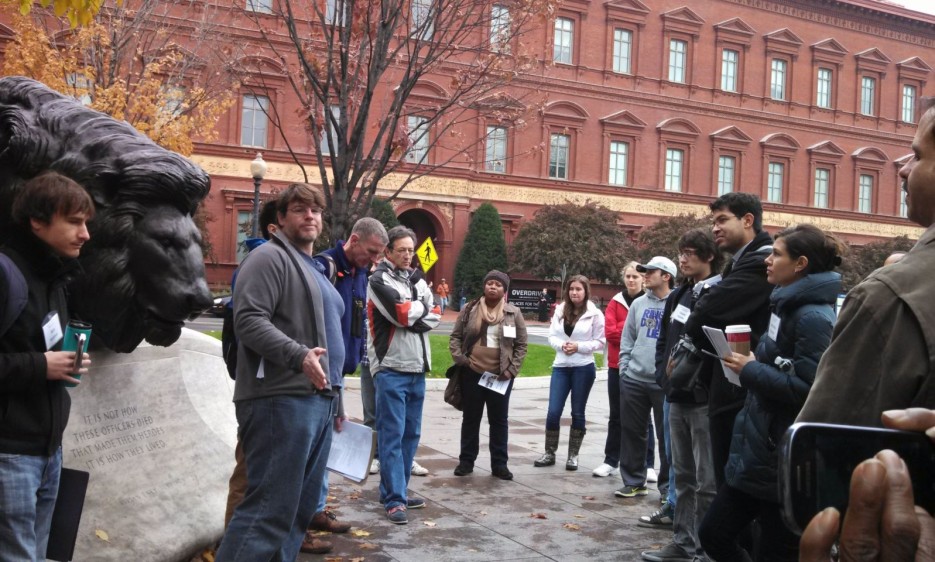CSPO Events CSPO in DC
- May 09, 2014
New Tools for Science Policy
Development Orthodoxy in the Himalayas
A Case of Persistent Policy Failure in Agriculture
In an era of globalization and environmental uncertainty, improving the livelihoods of smallholder farmers has become a high priority in agricultural development agenda of policy makers.
Netra Chhetri
- October 22, 2014
Envisioning and Deliberating Differently
Futurescape City Tours in Washington DC

As technology becomes more complex and pervasive in society, its potential impact on urban environments and citizens’ day-to-day lives grows. Ensuring that the publics have the opportunity to understand, respond to, and influence future directions related to innovation is therefore imperative for upholding a truly democratic society. In an effort to create a more inclusive, sustainable, and integrated public engagement and deliberation experiences, researchers at the Center for Nanotechnology in Society at Arizona State University (CNS-ASU) developed the Futurescape City Tours (FCTs). Please join us for a photographic and experiential journey through the citizen’s eye and a conversation among participants, designers, facilitators, and scientists of the FCT in Washington DC.
Kathryn De Ridder-Vignone, David Tomblin, Mahmud Farooque
- October 23, 2014
New Tools for Science Policy
Deliberating Differently
The Futurescape City Tours
In an effort to create a more inclusive, sustainable, and integrated public engagement experience, researchers at the Center for Nanotechnology in Society at Arizona State University (CNS-ASU) developed Futurescape City Tours (FCTs).
Kathryn De Ridder-Vignone, David Tomblin
- November 10, 2014
New Tools for Science Policy
Informing Science Policy Deliberation
Society and decision makers are calling on science to produce more useful information that informs problems, clarifies choices and expands alternatives.
Elizabeth C. McNie, Adam Parris
- December 05, 2014
Dupont Summit 2014 on Science, Technology, and Environmental Policy Issues
The purpose of the Dupont Summit is to promote interdisciplinary dialogue about pressing issues related to science, technology and the environment. The conference mirrors the interest of the PSO and its partners in promoting conversation about current policy concerns.
- December 09, 2014
New Tools for Science Policy
What Factors Lead to Success on Research Collaboration
Some Tales from the Frontline
What are the strategies and motives for research collaborations? Are there differences between “cosmopolitan” and “local” collaborators? What leads to bad or “nightmare” collaborations? What approaches do researchers use in dealing with severe problems? Do men and women choose different approaches in working with collaborators?
Barry Bozeman
- December 09, 2014
Teamwork in Science: Optimizing Collaboration
ACS Science & the Congress Project and Arizona State University’s Consortium on Science Policy Outcomes (ASU CSPO)
Science is a human endeavor, often conducted by teams of researchers. The human interactions between team members can mean some projects flourish or exceed their goals while other studies flounder or crumble. In a world with limited resources to support complex or high-stakes scientific research, understanding effective team structures can inform science policy and research priority decisions. This panel will bring their experience from different scientific research sectors and ideas on how scientists can build productive teams and avoid dysfunctional collaborations.
Daniel Sarewitz, Adam Parris
- January 15, 2015
How Will Human Ingenuity Handle a Warming Planet?
Future Tense Event
What opportunities does global climate change for making our societies more equitable, prosperous and resilient in the long run?
- January 16, 2015
Reinventing Climate Change
CSPO Conversations
Climate policy is broken. A huge part of the problem is the way climate change and the policies intended to address it are framed and communicated. Pragmatic and tangible options for tackling climate change are often overlooked in a contentious debate focused on climate change deniers, symbolic actions like opposition to the Keystone XL pipeline, and overheated rhetoric about a coming climate apocalypse. This tired narrative seems to have accomplished little beyond breeding cynicism and apathy across a broad swath of the global public. How do we enlarge and enrich this conversation, and take pragmatic steps toward a positive future? Can we connect climate policy and other environmental concerns to actions that provide near-term benefits for society while enhancing our capacity to deal with climate change in the long run?
Daniel Sarewitz, Kartikeya Singh Singh
- January 20, 2015—January 13, 2015
International Response to Nuclear Emergencies: The Case of Fukushima
SIREN Seminar
A new speaker series featuring leading international experts on nuclear emergency response. Part of an NSF CAREER grant; hosted by Virginia Tech’s Department of Science and Technology in Society.